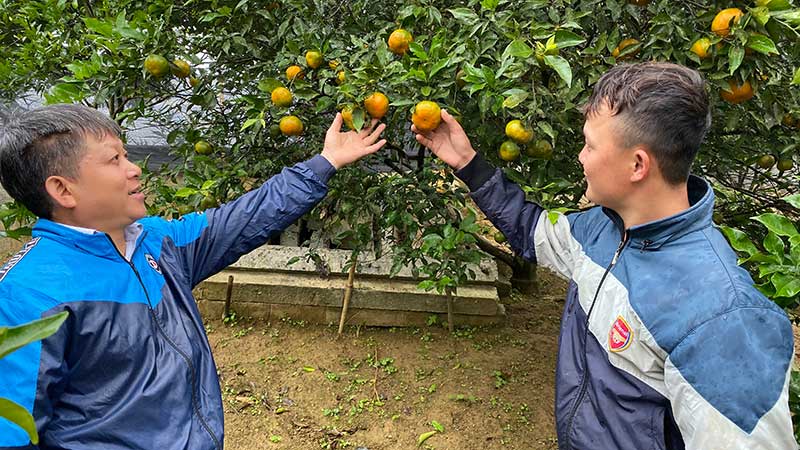
(HBO) – The road to Nam Son commune (now Van Son commune – Tan Lac district) in the last days of the year was full of trucks carrying tangerines. Some garden owners said they reaped a bumper harvest this year with good prices.
 Locals in Nam
Son commune (now Van Son commune – Tan Lac district) are happy with the bumper
harvest of tangerine.
Locals in Nam
Son commune (now Van Son commune – Tan Lac district) are happy with the bumper
harvest of tangerine.
The tangerine variety in Nam Son is an old
indigenous one, which was restored in 2005.According to statistics, the commune has 105 hectares of land under this
variety of tangerine, of which about 25 hectares are in harvest season.
This fruit variety is suitable with the local
soil and climate, and it has been defined as a key plant to help local people
reduce poverty.
At present, all households across the commune
are growing tangerines in their gardens. Many have converted their food crop areas
to tangerine gardens with the hope of improving incomes.
In the 2019 crop, the total output of tangerines
in the commune reached about 250 tonnes, up 100 tonnes compared to the previous
year. Prices ranged between 20,000 - 25,000 VND per kg.
In addition to expanding the area under
tangerines, households operating homestay services in Chien hamlet also organize
tours for visitors to experience fruit caring and picking activities. Tourists
can enjoy the fruit right at the garden.
Chairman of the commune’s People’s Committee Bui
Van Lung said locals are very happy because both the output and prices of the
fruit in the 2019 crop increased over the previous year.
The Intellectual Property Department of the
Ministry of Science and Technology also granted a certificate recognising the
collective trademark of Nam Son – Tan Lan tangerines, which helped promote this
fruit in the domestic market./.
According to data from the Hoa Binh Provincial Party Committee, the industrial production index for the first six months of 2025 is estimated to have increased by 20% compared to the same period last year. This marks the highest year-on-year growth rate for this period since 2020.
In the first six months of 2025, Hoa Binh province’s export turnover was estimated at 1.145 billion USD, marking an 18.11% increase compared to the same period in 2024. Import turnover was estimated at $ 804 million, a 17.15% increase, which helped the province maintain a positive trade balance.
The lives of the ethnic minority farmers in Tan Lac district have gradually improved thanks to the new directions in agricultural production. This is a testament to the collective strength fostered through the professional associations and groups implemented by various levels of the district’s Farmers’ Union.
With the motto the "product quality comes first,” after nearly one year of establishment and operation, Muong village’s Clean Food Agricultural and Commercial Cooperative, located in Cau Hamlet, Hung Son Commune (Kim Boi district), has launched reputable, high-quality agricultural products to the market that are well-received by consumers. The products such as Muong village’s pork sausage, salt-cured chicken, and salt-cured pork hocks have gradually carved out a place in the market and they are on the path to obtaining the OCOP certification.
In the past, the phrase "bumper harvest, rock-bottom prices" was a familiar refrain for Vietnamese farmers engaged in fragmented, small-scale agriculture. But today, a new spirit is emerging across rural areas of Hoa Binh province - one of collaboration, organisation, and collective economic models that provide a stable foundation for production.
Maintaining growing area codes and packing facility codes in accordance with regulations is a mandatory requirement for agricultural products to be eligible for export. Recently, the Department of Agriculture and Environment of Hoa Binh province has intensified technical supervision of designated farming areas and packing facilities to safeguard the "green passport" that enables its products to access international markets.



 Locals in Nam
Son commune (now Van Son commune – Tan Lac district) are happy with the bumper
harvest of tangerine.
Locals in Nam
Son commune (now Van Son commune – Tan Lac district) are happy with the bumper
harvest of tangerine.